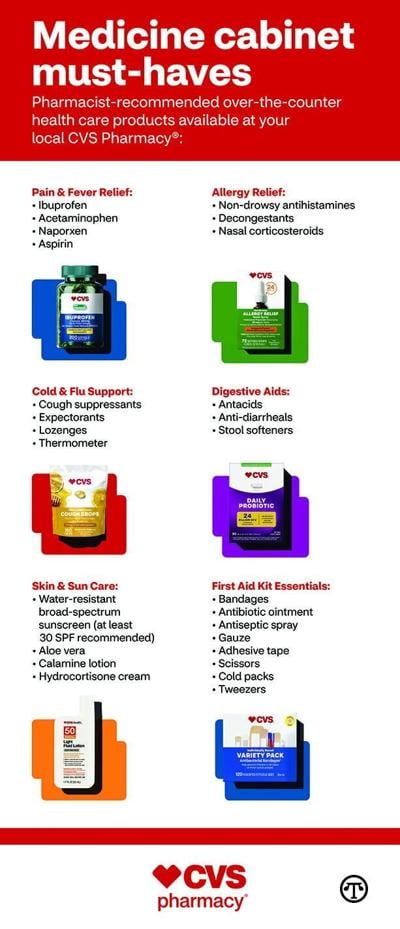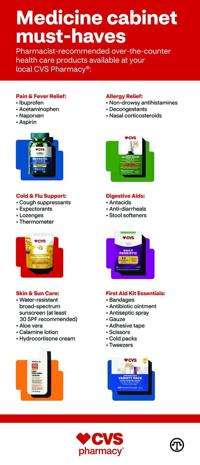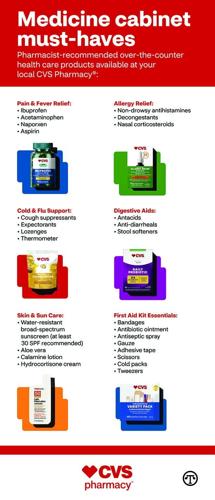(NAPSI)—A well-stocked supply of medicine must-haves can sometimes mean the difference between a minor inconvenience and a potential emergency room visit. From summer sunburns to allergy flare-ups, headaches or tummy troubles, keeping stock of appropriate over-the-counter products—and knowing how and when to use them—can help to support health at home.
To help, CVS pharmacists across the country shared their top recommendations for what every household should consider having on hand, including some surprising items consumers might not think of. Whether you’re restocking your first-aid kit, preparing for seasonal allergies or updating your emergency supplies, CVS Pharmacy can make it easy to build a collection of essentials that support everyday and unexpected health needs.
Start With the Basics
While every family is different, pharmacists recommend the following basic categories:
• Pain and fever relief support: Oral options include ibuprofen, acetaminophen, naproxen and aspirin; topical pain relievers include diclofenac and lidocaine.
• Allergy relief support: Non-drowsy antihistamines, decongestants and nasal corticosteroids.
• Cold and flu support: Cough suppressants, expectorants, lozenges and a thermometer.
• Digestive aids: Antacids, anti-diarrheals and stool softeners.
• Skin and sun care: Water-resistant, broad-spectrum sunscreen (at least 30 SPF recommended), aloe vera, calamine lotion and hydrocortisone cream.
• First aid kit supplies: Bandages, antibiotic ointment, antiseptic spray, gauze, adhesive tape, scissors, cold packs and tweezers.
Smart Additions You Might Not Expect
Once you’ve covered the essentials, pharmacists also recommend including a couple of often-overlooked items:
• Diphenhydramine: Available in both liquid and tablet forms for adults and children ages 6 and older. May help in allergy emergencies and is useful for short-term symptom relief while awaiting further medical care.
• Electrolyte packets: Handy for rehydration after illness or overheating. While not a substitute for medical attention in serious cases of dehydration, they may be helpful for early replenishment.
Tailor Your Medicine Must-Haves to Your Family
There’s no one-size-fits-all approach when stocking up on medicine must-haves, and your selections should reflect you and your home. While the term “medicine cabinet” is commonly used, the bathroom is not the best storage place due to humidity.
Medications should be stored in a cool, dry place, unless otherwise specified. Keep them out of reach and sight of children and pets. Even simple items such as vitamins or pain relievers can be dangerous if they are accidentally ingested. Childproof containers and lockable cabinets can help prevent accidents and keep your home safe.
Homes with children should include children’s formulations of fever reducers and pain relievers. Always keep products labeled and dosage instructions handy. A pharmacist can help parents pick the right strength based on age and weight.
Older adults or those managing chronic illnesses may need products compatible with their prescription medications. A discussion with your pharmacist can help ensure you’re avoiding negative interactions and selecting the most effective options.
Prepare for Emergencies Beyond Just Supplies
Being prepared for an emergency means staying organized. Pharmacists recommend keeping a written record—either taped inside your medicine cabinet or stored nearby—with emergency contact numbers, a list of current medications with dosages, an allergy list, your primary health care provider’s information and a copy of your health insurance details.
CVS Pharmacy has a robust selection of health and wellness products and first-aid kits, plus travel-sized items for on-the-go support, and CVS pharmacists are available to help you choose the right products, especially if you’re managing multiple medications or looking for family-friendly options.
Word Count: 543




(0) comments
Welcome to the discussion.
Log In
Keep it Clean. Please avoid obscene, vulgar, lewd, racist or sexually-oriented language.
PLEASE TURN OFF YOUR CAPS LOCK.
Don't Threaten. Threats of harming another person will not be tolerated.
Be Truthful. Don't knowingly lie about anyone or anything.
Be Nice. No racism, sexism or any sort of -ism that is degrading to another person.
Be Proactive. Use the 'Report' link on each comment to let us know of abusive posts.
Share with Us. We'd love to hear eyewitness accounts, the history behind an article.